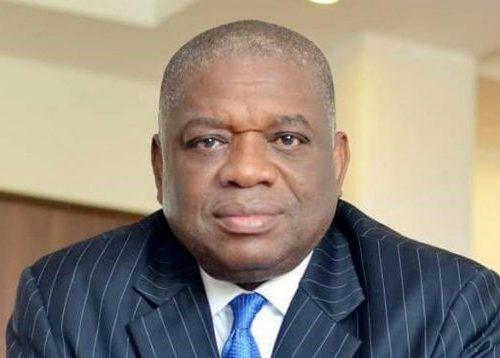After a busy morning at the Lagos Business School, US Deputy Treasury Secretary, Wally Adeyemo, unwound with a leisurely tour of Ogidi Studios in the evening. During his visit, his warm and approachable nature shone through as he engaged with young talents, shared witty remarks, and openly expressed his fondness for party jollof rice, Tiwa Savage’s music, and his belief in the vast opportunities for US collaboration within Nigeria’s thriving creative industry, Vanessa Obioha writes
if the infamous traffic along Lagos State’s Lekki-Ajah axis had any effect on the US Deputy Treasury Secretary, Wally Adeyemo, it certainly did not show in his demeanour when he embarked on an evening tour of Ogidi Studios. Adeyemo had spent the earlier part of the day delivering talks at the Lagos Business School, passionately identifying economic reforms and expressing the United States’ willingness to collaborate with Nigeria in forging a brighter future.
As he entered the serene surroundings of the studios, he exuded an air of composed grace, taking deliberate yet unhurried strides as he explored the premises with Idris Olorunnimbe, the Group Chief Executive of The Temple Management Company, the owners of Ogidi Studios.
It was Adeyemo’s first time in Nigeria since his family’s migration to the United States over four decades ago. His parents, a nurse and a high school principal, had crossed the ocean in pursuit of the American dream for their toddler and his siblings. Little did they know that Providence would guide Adeyemo’s path to greatness.
Raised in a two-bedroom apartment in California, he graduated from Eisenhower High School and earned a bachelor of arts degree from the University of California, Berkeley. Later, he would receive a juris doctor degree from Yale Law School.
“It’s good to be back in Nigeria because in so many ways Nigeria has changed since my family left more than 40 years ago,” he said during an exclusive chat with THISDAY. “But things remain the same. It’s just the entrepreneurial spirit and in the midst of that the Nigerian people, I think that is the most powerful thing in Nigeria.”
Born Adewale Adeyemo in Ibadan, the Oyo State capital, Adeyemo’s remarkable career within the US government has earned him heroic status both in the United States and Nigeria. His appointment to President Joe Biden’s cabinet in 2021 was celebrated in the Black community and Nigeria. As the highest-ranking Nigerian-American official and the highest-ranking member of the African diaspora in President Joe Biden’s administration, he also holds the distinction of being the first black man to occupy a prominent position in the US Treasury Department. This achievement gave his three-day visit to Nigeria a homecoming aura.
Wally Adeyemo’s rise in the US. government began during his university years, marked by leadership and compassion. He led students in mourning after 9/11 president of the Associated Students of the University of California (ASUC). He organised a campus vigil, offered free phone calls, and provided words of consolation to 12,000 people at Memorial Glade, reflecting his humanity and kindness.

He later joined John Kerry’s presidential campaign, held roles in the Obama White House, and was the inaugural Chief of Staff for the Consumer Financial Protection Bureau. After leaving government service, he served as Obama Foundation president and advised various organisations on economic equity. His return to the Treasury Department marked his second tenure, where he played a key role in trade negotiations like the Trans-Pacific Partnership.
His visit to Nigeria aimed to deepen cultural and economic ties between the two countries. Despite his towering status, Adeyemo remained approachable during his interactions with the young people he met at Ogidi Studios. For every young individual he encountered, he displayed genuine interest in their work and established rapport with them in a friendly manner. For instance, he commended two artists working on graffiti on one of the outside walls of the studios—artists Jahlove and Chima, who were among a select few mentored by seven American artist-educators from Next Level – the U.S. Department of State’s dance and music exchange program – during their two-week residency at Ogidi Studios.
“The greatest opportunity you have is that three out of five Nigerians are under the age of 25, doing things like being engaged in the creative industries, where today Nigerian culture is not only viewed in Nigeria but it’s viewed in the United States and around the world because of studios like Ogidi Studios,” he remarked.
Ogidi Studios, renowned for its cutting-edge technology in audio recording and video production, is a multifunctional facility encompassing all aspects of the creative industry. Olorunnimbe provided a detailed account of the studio’s successful projects, including contributing to the soundtrack for the film ‘Black Panther: Wakanda Forever,’ as took Adeyemo around.
“We hope that if and when the third sequel comes out, we will fully partake in production.”
He also highlighted the laudable achievements of creatives in the music and film industry.
Each creative unit in Ogidi Studios resembles a maze, where one creative door leads to another, from animation to recording studios—each unit is a marvel. The units are also named after popular African cities. For example, one of the rooms is called Eko, a gallery with orange-coloured walls adorned with portraits of African musicians and influencers who have contributed to the growing popularity and relevance of African music.
As Adeyemo gazed at the images, which included afrobeat legend Fela Anikulapo-Kuti, veteran juju musician King Sunny Ade, Angelique Kidjo, Wizkid, Burna Boy, Davido, Tiwa Savage, and veteran music promoters and broadcasters Kenny Ogungbe and Dayo Adeneye, one wondered if he was overwhelmed by nostalgia.
“You know, I remember growing up as a kid with my father playing King Sunny Ade and Fela,” he said. “And now you look at all of the afrobeats artists, including people that I know personally and others who are continuing the tradition of telling Nigerians stories through music, culture and art.
“And it’s great to see how that culture and art is no longer only being enjoyed by Nigerians but being enjoyed all over the world. I have friends not only in America but in Europe and Latin America, who today get to listen to afrobeats and hear the stories that are told by African artists. And I think that it helps people see the holistic story that is Nigeria and Africa.”
Olorunnimbe played the perfect host, introducing each member of his team and creative talents who are signed to his management company to Adeyemo, adding humour that lit up the atmosphere. During a tour of one of the recording studios, he gave Adeyemo a quick tutorial on music editing and even asked him to play the role of a producer, posing as if he was editing sounds on a mixing console. Adeyemo gladly indulged him, and for a moment, he assumed the role of a music producer while listening to Tiwa Savage’s ‘All Over.’ It turned out that the song held a special meaning for him.
“It was the entry song at my Nigerian traditional wedding ceremony,” he revealed.
Adeyemo’s playful side was fully glimpsed when he toured the green room where BBNaija alumni Bisola Aiyeola and Lilo Aderogba were preparing for a shoot. He engaged with them and even agreed to an impromptu interview. Excitedly, they quizzed him on his favourite Naija food. Take a guess. It’s jollof rice, of course, but not just any type. Adeyemo emphasised that he preferred party jollof rice. When he was asked to speak Yoruba, he skillfully deflected the question with a witty remark.
As Adeyemo continued the tour, navigating through the creative maze, he couldn’t help but ponder on how the revenue generated from the creative industry could be profitable for practitioners.
“Yesterday, I had a chance to have dinner with some young Nigerians and talk to them about what they’re doing in terms of being part of the creative industry. And one of the questions they asked was, ‘What can we do to make sure that Nigeria benefits more from the work that I’m doing in the creative industry?’ And part of that is by having Nigeria invest in building institutions, like Studios, where Nigerian artists have the ability to record in Nigeria and Nigerian studios, where you build up the entire ecosystem so that more of the value from creativity is captured by the Nigerian economy.
“Ultimately, that’s in Nigeria’s interest because it allows you to build industries that support your young talent, but it’s also in our interest because we care deeply about making sure that Nigeria is economically successful, and that young people regardless of what they want to do, they have the ability to do it here Nigeria. There’s so much potential for talent amongst the next generation of Nigerians. The question is, how can we meet that talent with opportunity? And that includes building small medium-sized businesses to serve their needs.”
During his three-day visit to Nigeria, where he met with leaders, creatives and entrepreneurs, Adeyemo discovered the number of unicorns that are emerging in the country.
“I think the thing that I’ve discovered while being in Nigeria, is that, the ecosystems that feed on building technology giants in places like Kenya, and Silicon Valley, now exist here. You see the number of unicorns that are starting in Nigeria, and for each unicorn, just in my conversations, there are hundreds of other Nigerians, young people who are thinking about starting businesses that can be tomorrow’s unicorns, that will help create jobs here in Nigeria. And the key is how do you make sure that they get access to both the customers, but also the capital that allows them to grow their businesses.”
He added: “Ultimately, the thing that I’ve been so impressed by is the building of Nigerian small and medium-sized businesses that are serving the creative community, be it studios like the one that we are in here, and also different parts of the ecosystem. And things that I look forward to seeing the Nigerian government do is investing in that ecosystem because investing in that ecosystem will not only create jobs but also the creatives for all the different industries that help serve them. And that’s a great way to help grow the economy.”
Adeyemo’s visit underscored the immense opportunities for collaboration between the United States and Nigeria, particularly in light of the newly created Ministry of Art, Culture, and Creative Economy by President Bola Tinubu.
“I think it’s going to offer a great deal of opportunity because the Nigerian people are creative, the American people are creative, and ultimately, unlocking the economic potential of creativity is one of the things that Nigeria is doing and needs to do more of. Let it go through the exchange of people-to-people contacts between the United States and Nigeria, but American investment can help unlock that type of creative economy here in Nigeria,” said Adeyemo.
ThisDay





















